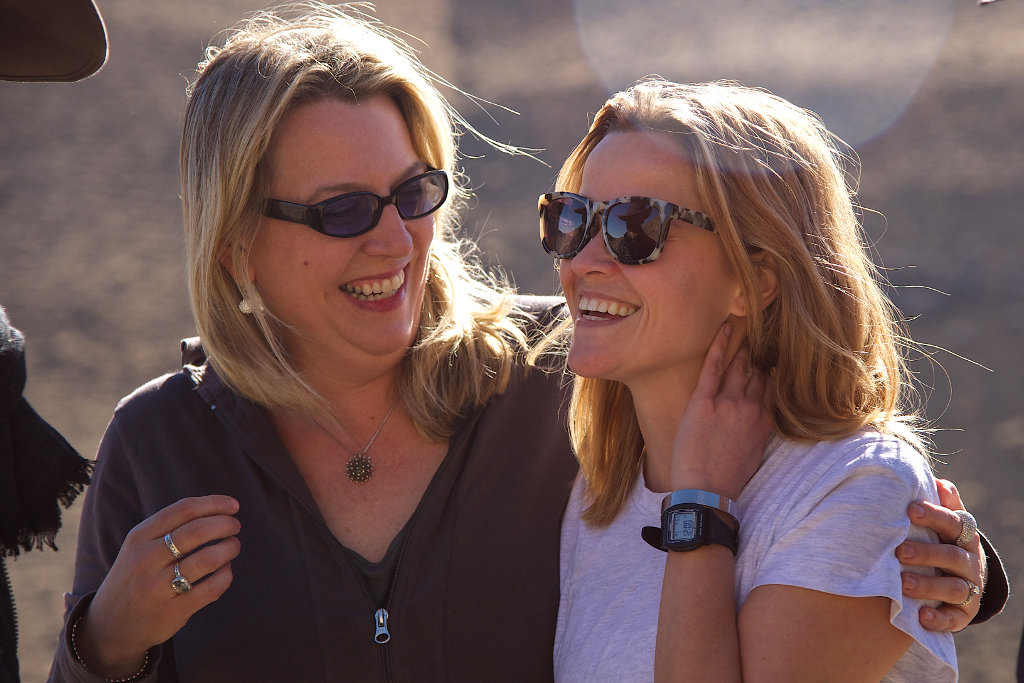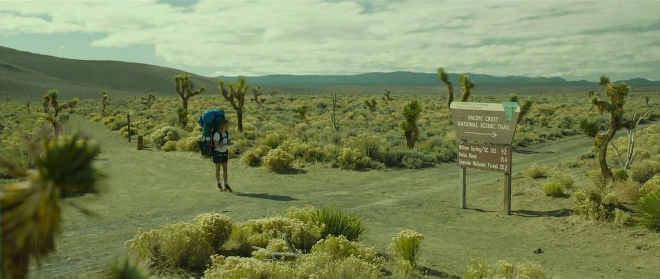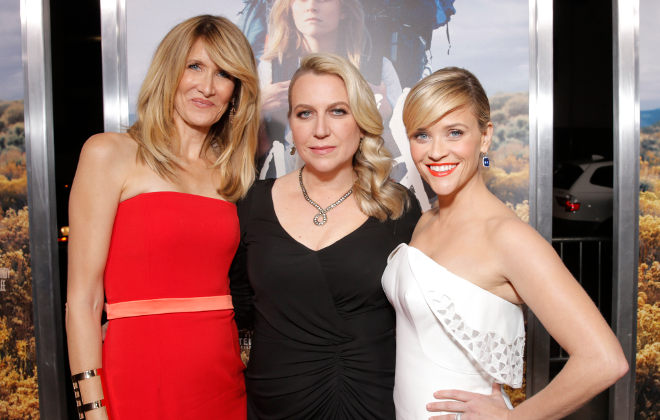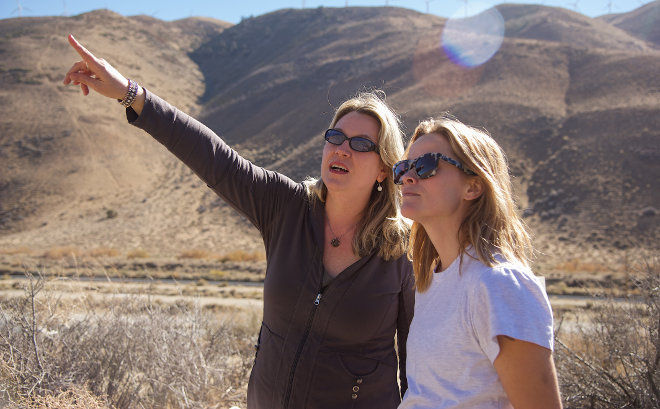“Women’s Work Is Taken Less Seriously”: An Interview With ‘Wild’ Author Cheryl Strayed
The author behind the book behind the critically acclaimed film told us what it's like going from hiking boots to heels.

How interesting can a walk really be?
For author Cheryl Strayed, it would take 17 years to answer that question. In 1995, she hiked America’s Pacific Crest Trail – a journey measured in three backpack-straining months, 1700 kilometres of footsteps, six lost toenails and one pair of too-tight hiking boots that were so beyond retrieval that they ended up in Mother Nature’s shoe collection.
Nothing happened and everything happened – it radically altered the pathway of Strayed’s remaining life and became the focus of Wild, a memoir that deserves the insane sales figures garnered since its release in 2012 (1.75 million copies so far), and a critically acclaimed, Reece Witherspoon-starring biopic, which opened in Australia last week.
Seeing the actor re-enact the author’s past – in the same clothes, carrying a replica of her backpack – was “probably the most surreal experience of my life”, says Strayed. And being able to attend the Golden Globes and other glitzy Wild-related honours has turned the writer’s life into a dream sequence.
That Strayed’s life got so dramatically rerouted – from waxing floors as a janitor’s assistant in high school, to becoming a bestselling author/awards-ceremony guest – is a testament to her knockout writing. She has a punk flair and beautiful tamper-proof sentences, and a galvanising way of making you want to take life on — whether it’s through the raw heartbreak of Wild, or the straight-talking prose of her ‘Dear Sugar’ advice columns (since collected in the book, Tiny Beautiful Things; her prescription that you “write like a motherfucker” is so memorable that it’s been immortalised on a mug).
Strayed also currently administers advice through the excellent Dear Sugar podcast, on which she recently talked about how the events that triggered Wild came from “the weakest moment of my life”. And yet Reese Witherspoon, screenwriter Nick Hornby and director Jean-Marc Vallée were able to make such a powerful film from this – from retraced footsteps and from a shuffled deck of moments from Strayed’s life: her mother’s death, Strayed’s divorce, toying with heroin and express stops to self-destruction; and the flipsides, too – the infectious and limitless nature of her mother’s love, the unexpected connections with hiking strangers, and the growing will to continue, despite so many temptations to split.
The result is as enduring as the landscape that Witherspoon encounters in Wild: honest, unadorned and, at unexpected moments, completely breathtaking.

If it’s not embarrassingly obvious, Cheryl Strayed is a major hero of mine; so it was great to be able to talk to her over the phone from her home in Portland, Oregon.
–
Reese Witherspoon calls Wild a radical film, because the protagonist doesn’t land the dream man or career; in fact, by the end, she has no money to her name and has lost so much. But the finale is still triumphant.
I think she’s right about Wild. We very seldom see movies, first of all, where there’s a woman protagonist. And the end of her story isn’t about finding love with a man. We never see that in film, and for that reason it’s radical. But in real life, we see that all the time.
We talk about the lack of roles for strong women in Hollywood, but there’s no lack of strong women in any of our lives.
In both versions of Wild, you’re interviewed by the Hobo Times, because you’re mistaken for a female tramp. Is that still the most unusual publication you’ve talked to?
Probably, probably! [Laughs] I don’t know if they ever published it. When I was researching the book, I looked for the Hobo Times, and wasn’t able to find it, so who knows? But that was the weirdest encounter I’ve ever had with a journalist.
In Vanity Fair, you said, “I honestly think the real liberation of women is profoundly connected to the shoes we wear. Until we as a gender refuse to wear any shoe that would be uncomfortable to walk a mile in, we’re perfectly screwed”. But you’re now at red-carpet events in heels that are killing you. Your appearances are because of Wild’s success – but ironically you’re not even allowed to celebrate in comfortable shoes!
I know – it’s a paradox, like many paradoxes of my life! I think most women struggle with that.
These red carpet events are scary, stressful and new. I’m having to stand next to these beautiful actresses and pose for all these photographers – so for me to be a trailblazer when it comes to footwear, it was just too daunting [laughs]! So I took the easy way out. I learned how to walk in high heels – I wear my ‘sensible’ high heels, if there is such a thing.

Laura Dern, Cheryl Strayed and Reece Witherspoon (via Fox)
As well as Wild, Reese Witherspoon’s production company bought the film rights to Gone Girl. I thought Gone Girl was such a fiercely smart book – and was disappointed when it got disparaged as something your mum reads on the beach. Do you notice how ‘women’s books’ are put down in a way that men’s aren’t?
It’s an enormous problem that women’s work is taken less seriously in that regard. When Wild came out, I really had to assert to people that it wasn’t a book just for women. That it’s a book for people, I wrote it for people. With the book and film, the audiences believe that message. At least half my fan mail is from men.
You bring up Gone Girl as this book that’s read on the beach. I think that’s always the challenge; any book that does well in the marketplace is written off, because people tend to be snobs about that – “Any book that so many people love couldn’t be a book that I would love”, that kind of attitude. What can I say about that, except that they’re probably missing out on a lot of really good books?
At the end of Wild, you have 20c to your name. But you recently bought a house in cash with proceeds from the book. Does it spin you out, thinking about that turn of events?
It does. And it happened really quickly. So I’m 46; on my 44th birthday, I made the final payment on my student loans that I’ve been paying for 20-some years. I grew up poor, I put myself through college. I worked as a waitress, a teacher, a freelance writer – all of these things – and pieced it together, literally penny by penny, all these years. When Wild was released and became a bestseller, my husband and I were renting a two-bedroom half of a duplex. And then suddenly my fortunes changed.
That same year that I paid off my college education, I was able to open an account to start paying for my childrens’ college education. They’re nine and ten. Essentially, no writer has any business ever thinking they’ll ever make any money off their work. It’s generally not the way that it happens for writers. I never wrote because I wanted to write a bestseller. I wrote because I wanted to write the best work that I could, and give something beautiful to the world through story and language. This thing that has happened, which has become a financial boon, has been another surprise and delight.

Cheryl Strayed and Reece Witherspoon on the set of Wild. (Via Fox)
–
Wild, by Cheryl Strayed, is out now; Wild, directed by Jean-Marc Vallée, is in Australian cinemas now.
–
Lee Tran Lam is a writer based in Sydney. She runs a blog and podcast called The Unbearable Lightness of Being Hungry, and tweets from @leetranlam